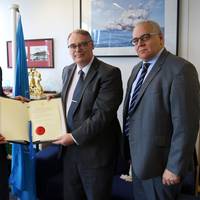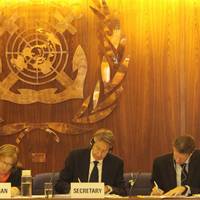Carbon Capture and Storage Under Seabed
Carbon capture and storage under the seabed is recognized as one tool in climate change mitigation. An International Maritime Organization (IMO) treaty, the London Protocol, provides the basis in international environmental law to allow CO2 storage.This week, a proposal to agree the early application of an amendment to allow sub-seabed geological formations for sequestration projects to be shared across national boundaries will be put before Parties to the London Protocol (LP) and its forerunner, the London Convention (LC).It would remove a barrier for countries which wish to make use of carbon capture and storage - but which do not have ready access to offshore storage sites within their national boundaries.
Caution Urged in Marine Geoengineering
In a new report, marine and social scientists are urging a precautionary approach towards these techniques which involve deliberate large-scale manipulation of the environment.Adding iron or other nutrients into the oceans to enhance natural processes to draw carbon from the atmosphere and creating foams which float on the surface of the sea to reflect sunlight back into the atmosphere are among a wide range of geoengineering practices which have been put forward as potential tools for countering climate change.But the report, published by the Joint Group of Experts on the Scientific Aspects of Marine Environmental Protection (GESAMP)…
UK First to Accept Marine Geoengineering Amendments
The United Kingdom has become the first State to formally accept the 2013 marine geoengineering amendments to the 1996 “London Protocol”, the treaty covering dumping of wastes at sea. The amendments support the precautionary approach by providing for specific marine geoengineering activities to be permitted only when the activity is assessed as constituting legitimate scientific research. Currently, only ocean fertilization for research purposes may be permitted. Meanwhile, the marine scientific expert group GESAMP is currently undertaking a comprehensive study on marine geoengineering to better understand the potential impacts of proposed marine geoengineering techniques on the marine environment – including social and economic consequences.
UK First to Accept Marine Geoengineering Amendments

The United Kingdom has become the first state to formally accept the 2013 marine geoengineering amendments to the 1996 “London Protocol”, the treaty covering dumping of wastes at sea. The amendments support the precautionary approach by providing for specific marine geoengineering activities to be permitted only when the activity is assessed as constituting legitimate scientific research. Currently, only ocean fertilization for research purposes may be permitted. Meanwhile, the…
Marine Geo-engineering to be Regulated

Marine geo-engineering, including ocean fertilization, will be regulated under amendments to the 1996 Protocol to the international treaty which regulates the dumping of wastes and other matter at sea. The amendments, adopted recently by Parties to the 1996 Protocol to the Convention on the Prevention of Marine Pollution by Dumping of Wastes and Other Matter, 1972, add a new article 6bis which states that “Contracting Parties shall not allow the placement of matter into the sea from vessels…
Sea Fertilization Objection by IMO Convention Signatories
Parties to international dumping treaties express concern about reported offshore iron fertilization by salmon fishing industry. Parties to the international treaties which regulate the dumping of wastes and other matter at sea have issued a statement of concern regarding the deliberate ocean fertilization activity that was recently reported to have been carried out in July of 2012 in waters off the west coast of Canada. The Contracting Parties to the Convention on the Prevention of Marine Pollution by Dumping of Wastes and Other Matter, 1972 (London Convention) and to the 1996 Protocol thereto (London Protocol), meeting in London from 29 October to 2 November 2012…
Iron Supplements Tested as Means to Improve Ocean Health and Climate
Researchers from the Woods Hole Oceanographic Institution (WHOI) will host a public forum to discuss the pros and cons of “iron fertilization” of the oceans as a means to mediate global warming. The forum, entitled “Ocean Fertilization: Ironing Out Uncertainties in Climate Engineering,” is a public follow-up to an interdisciplinary science workshop conducted at WHOI in September. The free event will be held at 2:30 p.m. on October 19 in the Redfield Auditorium on Water Street in the Village of Woods Hole, MA. The discussion of iron fertilization comes in response to several recent scientific and commercial proposals to spread dissolved iron into the sea.





